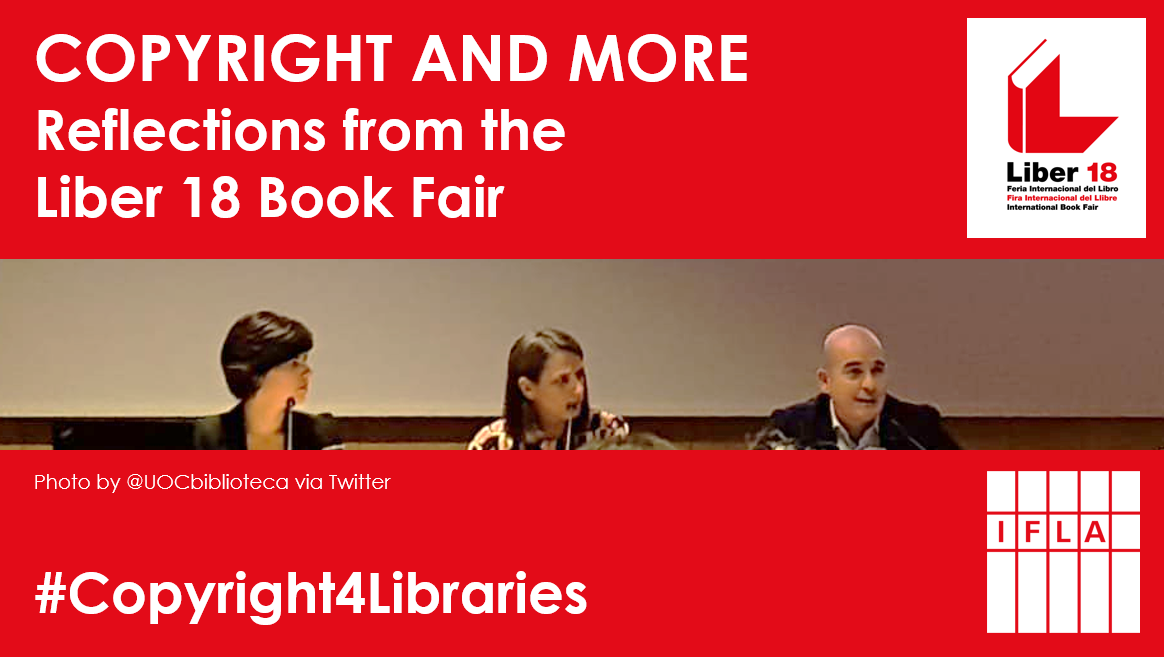
IFLA recently took part in a session during the LIBER bookfair held in Barcelona from 3-5 October. LIBER, organised by the Spanish Association of Publishers’ Guilds, is a biannual event that alternates between Madrid and Barcelona.
The panel discussion was organised by FESABID, the Spanish Federation of Societies of Archivists, Librarians, Documentalists and Museologists, and focused on libraries and intellectual property and imminent challenges. A crowd of librarians, but also publishers and decisionmakers, attended and participated in the session with interesting comments regarding the “struggle” that libraries go through in seeking to give access to knowledge under outdated copyright laws.
Discussions during the panel had a strong focus on two aspects: the European copyright reform and public lending.
The European copyright reform
The first one promises to update certain exceptions and limitations to copyright that should make the above-mentioned “struggle” for libraries softer. Although not all exceptions might become mandatory (see the Council and the Parliament’s new article on text and data mining, or the second part of article 4 on illustration for teaching in the Commission’s proposal), which is to the detriment of harmonization within the Union, they all seem like a step forwards in adapting copyright to the digital age.
Public lending rights
Meanwhile, public lending in Spain has a tumultuous history and is far from having reached a status where stakeholders are satisfied. Collecting societies still claim that the current system is so inefficient that it ends up creating more cost than benefit. Moreover, after the preliminary ruling by the CJEU in case C‑174/15 regarding e-lending, there was also some expectation on whether the European copyright reform directive would bring more legal clarity to the topic.
Currently, digital lending in Spain works under the eBiblio platform, accessible to all users with a Spanish public library card. Contrary to public lending of physical books, libraries do not buy and lend the works, but they are accessed through this government-established platform.
Collective management in Spain
This LIBER edition was held at an interesting moment for Spain, as the Government has recently amended its copyright law to transpose the collective management Directive and the Marrakesh treaty Directive.
Collective management organisations in Spain are given an important role under Spanish law. They are for instance in charge of collecting and distributing money for remunerated limitations to copyright such as the private copy limitation or public lending. Even though they have such a big responsibility, there are still claims regarding their lack of transparency and fraudulent activities on certain occasions.
The important role that collective management organisations (CMOs) play in Spain is also underlined by a specific provision regarding unwaivable right to equitable remuneration for authors, subject to compulsory collective management. It has been adopted not only for the provision that transposed the SatCab directive, but also with regards to the remuneration in the limitation for illustration for teaching (art. 32.4 TRLPI), the limitation to make private copies (art. 25 TRLPI) and the neighbouring right for press publishers (art. 32.2 TRLPI).
Such provisions have received a lot of criticism (from the Creative Commons community, and from the library community) for their negative impact on the free circulation of knowledge. Even if the “intention” is to ensure remuneration to authors, it means that cannot decide to share their creation freely.
The hurry to transpose this directive meant that the Marrakesh Treaty Directive, which was transposed at the same time, was adopted by Spain faster than expected. It opens up possibilities of cross-border exchange within the European Union and from the Union to third party countries that have ratified the Treaty. Given the large number of Spanish-speakers around the world, it is certainly very welcome news.
An hour was obviously too short to get into all these topics, which shows how there are a lot of areas that still require the library community’s attention. Their experience and engagement will be key in shaping the future of copyright law in the country.